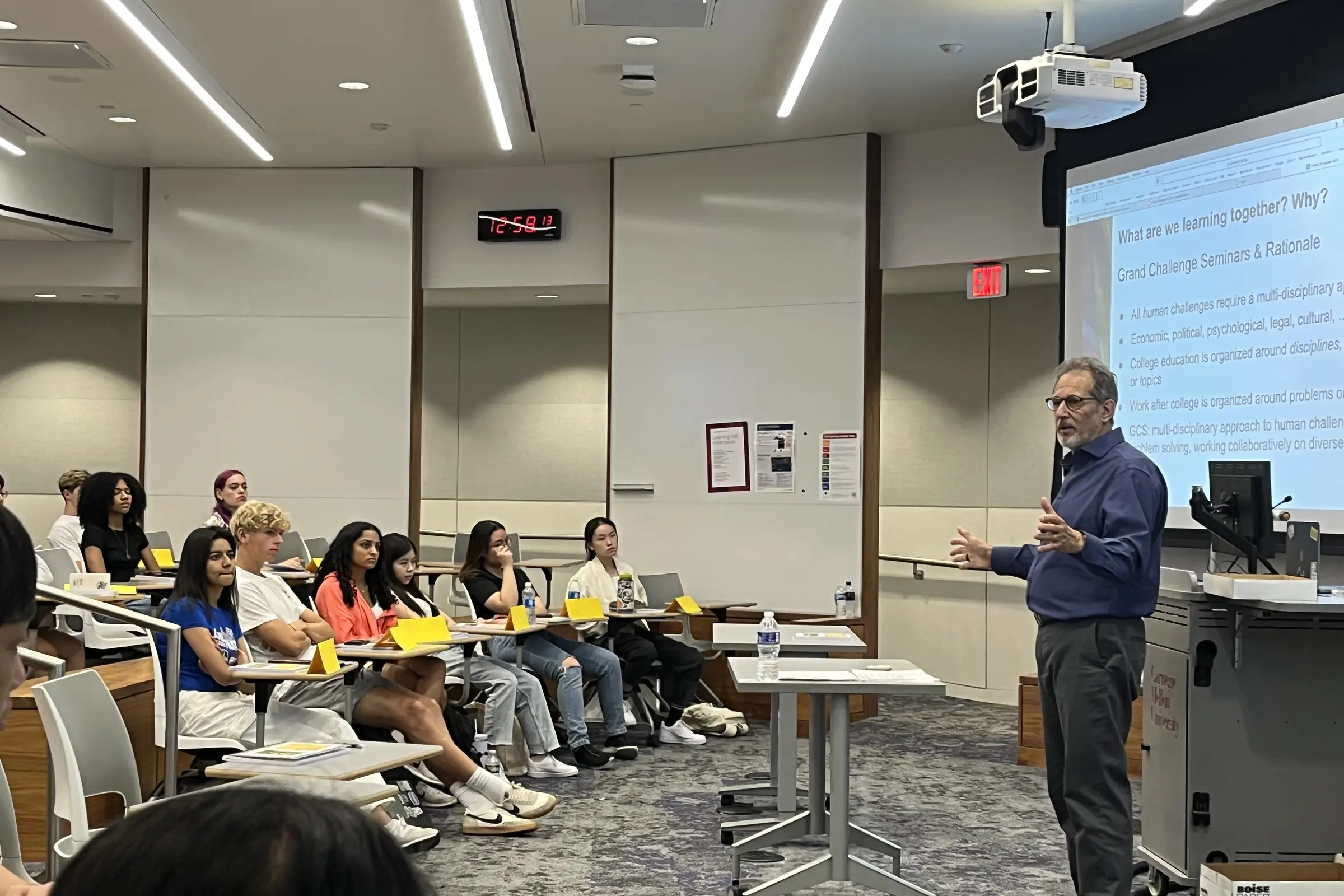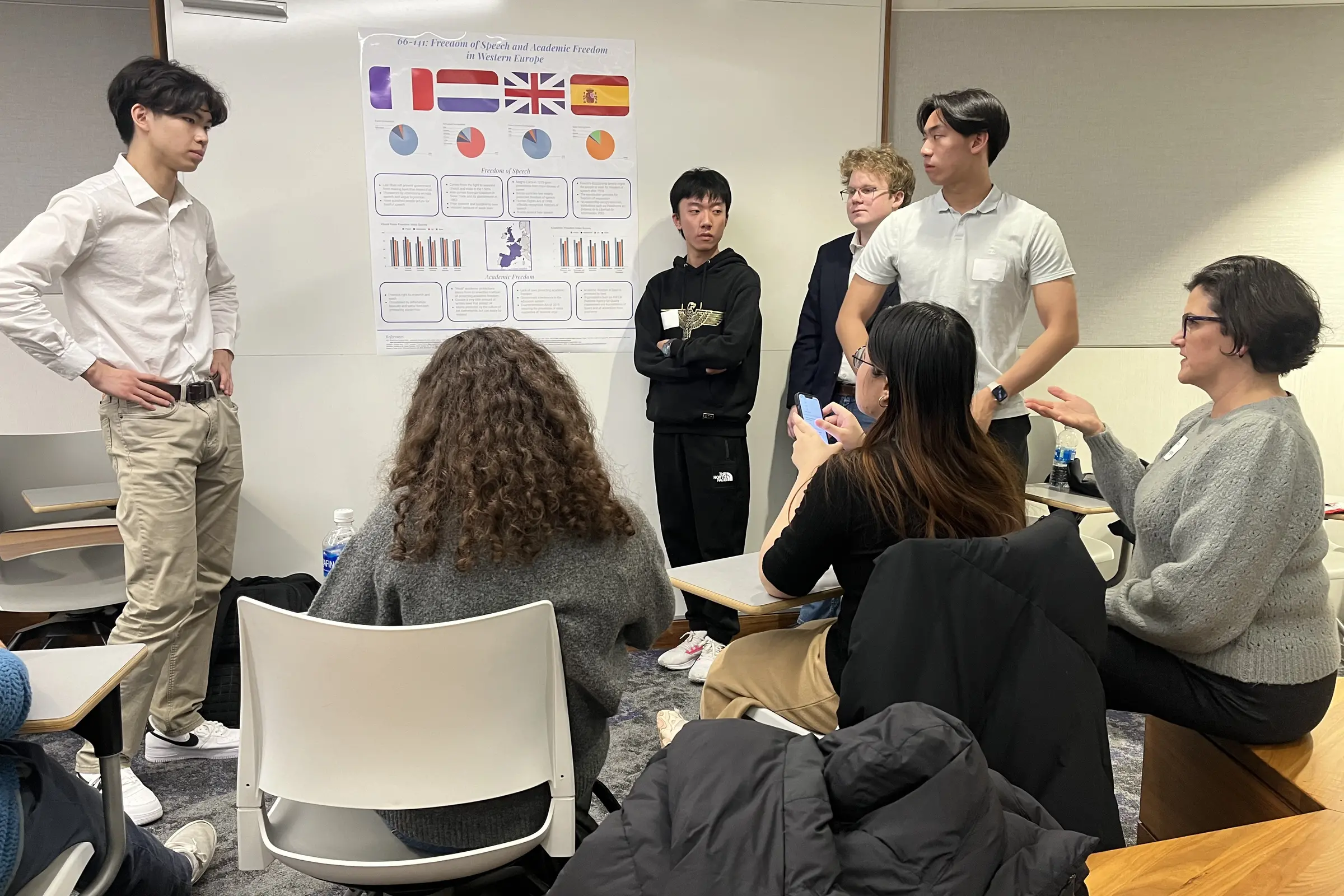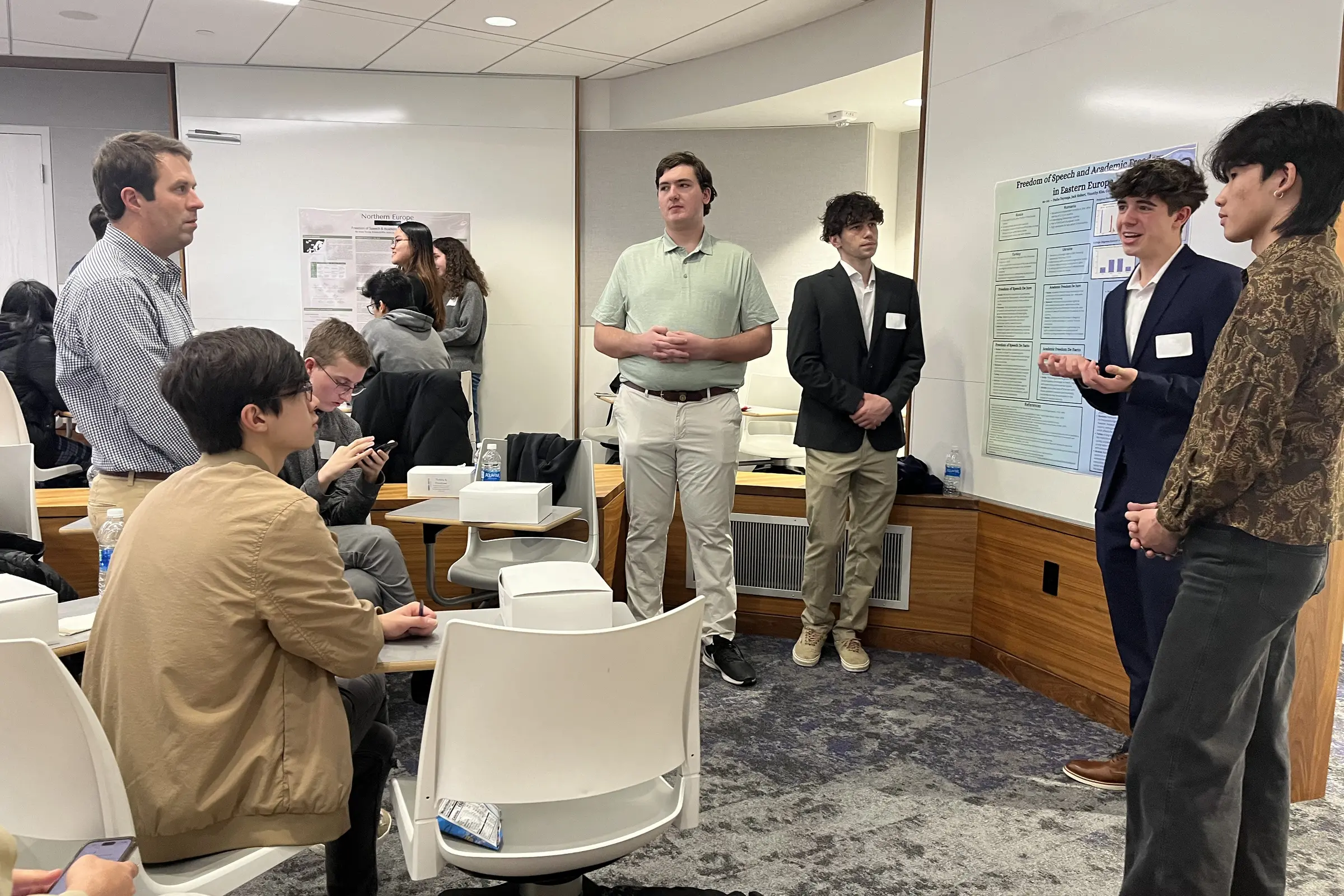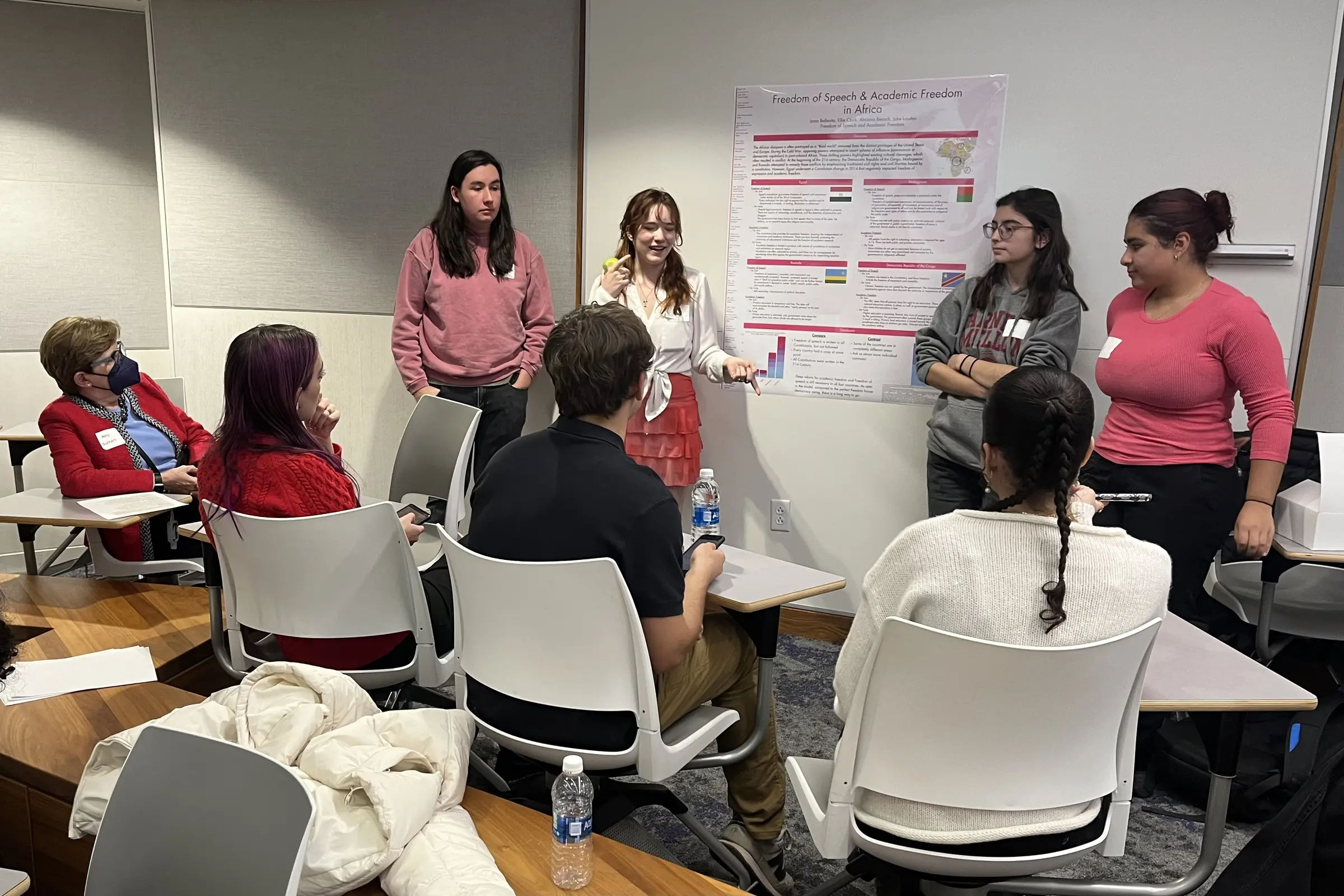Students Debate Freedom of Speech in Grand Challenge Seminar
By Kelly Saavedra
A new Grand Challenge Seminar in Carnegie Mellon University’s Dietrich College of Humanities and Social Sciences this past fall offered 40 first-year students a comprehensive exploration of the principles, controversies and significance of freedom of speech and academic freedom.
Co-taught by Richard Scheines, Bess Family Dean of the Dietrich College, and Sharon Carver, a psychology professor who is director of CMU’s Children’s School and associate dean for Educational Affairs, the course featured guest speakers from multiple disciplines and presented actual and hypothetical cases for students to examine through the lenses of philosophy, history, psychology and law.
“We emphasized from the start of the class that the topics were going to be sensitive and controversial, and that people were going to have to be very respectful and tolerant. It seemed to work really well. The students were very engaged and thoughtful,” Scheines said.
As each new case was introduced, students were asked to submit their baseline opinions through Slido, a Q&A polling platform used to gather audience insights during live or virtual meetings and events. Then, the class broke into small groups to discuss the case for five to 10 minutes.
First-year student Charles Nutbrown said the seminar was unlike any teaching he’d experienced before.
“There was a mix of almost every type of major, discipline and interest, which allowed for every individual to provide a unique experience on the content being presented. Disagreement and debate on the issues were encouraged, and techniques on how to support that type of debate were presented throughout the semester,” Nutbrown said. “In other words, this class did not just teach freedom of speech and academic freedom, it taught how to be a better presenter and leader.”
Carver said if they were going to teach students the importance of working across disciplines, then it only made sense they should explicitly teach best practices for collaboration, an emphasis of all Grand Challenge Seminars at the university.
“By bringing different perspectives to a difficult topic, you’re more likely to get a holistic approach to analyzing a situation,” she said. “You may not solve the problem, but you can get a broader analysis, a deeper understanding, and that helps you to be more ready to flexibly respond to situations that arise during implementation.”
When the Israel-Hamas war broke out mid-semester, students began to apply what they were learning in real time.
“The students were terrific,” Scheines said. “As volatile and difficult as these issues are, the discussion was good. When people were given the time to stretch out and say what they thought, others learned from it. The students who were a bit partisan came to appreciate the alternative perspective, and those who came in a bit detached from the conflict came to appreciate how complicated the background to this conflict really is. In the end, the students voiced all the nuance and complexity of the topics. It was very encouraging to see how much better an academic classroom context is compared to something like social media.”




The seminar’s guest speakers were primarily from CMU and included Dan Munsch, assistant general counsel, who presented on the law and freedom of expression; Nico Slate, head of the Department of History, who discussed civil liberties and civil rights from a historical perspective; Mark Kamlet, former provost and current co-director of the Collaboratory Against Hate, who spoke on the history of academic freedom; Simon Cullen from the Department of Philosophy, who talked about freedom of speech and college students; Chris Warren, associate department head of English, who spoke about freedom of the press, beginning with John Milton’s publication of “Areopagitica” in 1644; Gina Casalegno, who shared her experiences as vice president for Student Affairs and dean of students; and Amy Burkert, vice provost for education, who offered insights from having navigated freedom of speech and academic freedom issues while working to establish CMU’s international campuses.
Panel discussions featured Jonathan Caulkins and Roberta Klatzky, co-vice chairs of CMU’s Commission on Academic Freedom and Freedom of Expression, and a guest associated with City of Asylum, a non-profit organization based in Pittsburgh that helps writers exiled from their home countries because of their controversial writing.
Entertainment Technology Center faculty Brenda Harger and Ralph Vituccio visited the class to gather pitch ideas for a freedom of speech game for their students to develop during the spring semester.
First-year student Riona Duncan said the seminar really helped her understand why free speech is so critical, even when it can be unpleasant and offensive.
“I came into the course thinking hate speech should definitely not be protected. Now I'm convinced there is no way to censor hate speech without creating tools that can be used to censor speech that people in power simply disagree with,” she said. “I think the best way to address hatred is probably with more speech, not less.”
Scheines is so passionate about the campus being a place to have dynamic and nuanced conversations rather than you’re-with-us-or-against-us slogan fights, he was inspired to write an op-ed.
“It was a great experience for me, as a dean, to be in the classroom interacting with students in that way. There’s no substitute for that,” he said. “We even took them through a series of cases in which I, particularly, was on the front line and asked them what I should have done, and those discussions were great because they ended up coming up with pretty much the same solutions we did. And these are first-year students in their first semester!”
He added, “I think the students really came to a much more sophisticated understanding of how difficult it is to balance freedom of expression with creating an inclusive, respectful community.”
CMU is ranked 23rd among 254 American college campuses in this year’s College Free Speech Rankings compiled by FIRE. Carver attributes the good standing to two things the university does particularly well.
“In general, CMU is very thoughtful about things and how things are handled. Sometimes decisions are slow in coming, but that’s because there is much deliberation and they’re trying to get different people’s points of view,” she said. “We also take care to go in-depth with the students. Our administrators are very hands-on, proactive, not afraid to have dialogue and not afraid to admit when they’ve made a mistake.”
In 2020, CMU President Farnam Jahanian charged the Commission on Academic Freedom and Freedom of Expression, of which Scheines is a member, to explore and clarify the university’s commitment in a contemporary context. Their final report was shared with the campus community in 2022.
“The commission’s recommendations will help us become a model for the rest of the nation for how to embrace the power of discourse to unify, educate and build bridges, as well as support learning and discovery that brings diverse perspectives to our world,” Jahanian said.
Many of the resources that were developed for the Grand Challenge Seminar on freedom of speech and academic freedom are now being integrated into the archive that CMU’s University Libraries is developing as a result of the commission’s report.